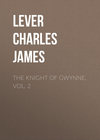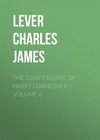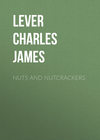Loe raamatut: «Charles O'Malley, The Irish Dragoon, Volume 2», lehekülg 9
CHAPTER XVI
MY CHARGER
Although I felt my heart relieved of a heavy load by the confession I had made to Power, yet still I shrank from meeting him for some days after; a kind of fear lest he should in any way recur to our conversation continually beset me, and I felt that the courage which bore me up for my first effort would desert me on the next occasion.
My determination to join my regiment was now made up, and I sent forward a resignation of my appointment to Sir George Dashwood’s staff, which I had never been in health to fulfil, and commenced with energy all my preparations for a speedy departure.
The reply to my rather formal letter was a most kind note written by himself. He regretted the unhappy cause which had so long separated us, and though wishing, as he expressed it, to have me near him, perfectly approved of my resolution.
“Active service alone, my dear boy, can ever place you in the position you ought to occupy; and I rejoice the more at your decision in this matter, as I feared the truth of certain reports here, which attributed to you other plans than those which a campaign suggests. My mind is now easy on this score, and I pray you forgive me if my congratulations are mal à propos.”
After some hints for my future management, and a promise of some letters to his friends at headquarters, he concluded: —
“As this climate does not seem to suit my daughter, I have applied for a change, and am in daily hope of obtaining it. Before going, however, I must beg your acceptance of the charger which my groom will deliver to your servant with this. I was so struck with his figure and action that I purchased him before leaving England without well knowing why or wherefore. Pray let him see some service under your auspices, which he is most unlikely to do under mine. He has plenty of bone to be a weight carrier, and they tell me also that he has speed enough for anything.”
Mike’s voice in the lawn beneath interrupted my reading farther, and on looking out, I perceived him and Sir George Dashwood’s servant standing beside a large and striking-looking horse, which they were both examining with all the critical accuracy of adepts.
“Arrah, isn’t he a darling, a real beauty, every inch of him?”
“That ‘ere splint don’t signify nothing; he aren’t the worse of it,” said the English groom.
“Of coorse it doesn’t,” replied Mike. “What a fore-hand, and the legs, clean as a whip!”
“There’s the best of him, though,” interrupted the other, patting the strong hind-quarters with his hand. “There’s the stuff to push him along through heavy ground and carry him over timber.”
“Or a stone wall,” said Mike, thinking of Galway.
My own impatience to survey my present had now brought me into the conclave, and before many minutes were over I had him saddled, and was cantering around the lawn with a spirit and energy I had not felt for months long. Some small fences lay before me, and over these he carried me with all the ease and freedom of a trained hunter. My courage mounted with the excitement, and I looked eagerly around for some more bold and dashing leap.
“You may take him over the avenue gate,” said the English groom, divining with a jockey’s readiness what I looked for; “he’ll do it, never fear him.”
Strange as my equipment was, with an undress jacket flying loosely open, and a bare head, away I went. The gate which the groom spoke of was a strongly-barred one of oak timber, nearly five feet high, – its difficulty as a leap only consisted in the winding approach, and the fact that it opened upon a hard road beyond it.
In a second or two a kind of half fear came across me. My long illness had unnerved me, and my limbs felt weak and yielding; but as I pressed into the canter, that secret sympathy between the horse and his rider shot suddenly through me, I pressed my spurs to his flanks, and dashed him at it.
Unaccustomed to such treatment, the noble animal bounded madly forward. With two tremendous plunges he sprang wildly in the air, and shaking his long mane with passion, stretched out at the gallop.
My own blood boiled now as tempestuously as his; and with a shout of reckless triumph, I rose him at the gate. Just at the instant two figures appeared before it, – the copse had concealed their approach hitherto, – but they stood now as if transfixed. The wild attitude of the horse, the not less wild cry of his rider, had deprived them for a time of all energy; and overcome by the sudden danger, they seemed rooted to the ground. What I said, spoke, begged, or imprecated, Heaven knows – not I. But they stirred not! One moment more and they must lie trampled beneath my horse’s hoofs, – he was already on his haunches for the bound, – when, wheeling half aside, I faced him at the wall. It was at least a foot higher and of solid stone masonry, and as I did so I felt that I was perilling my life to save theirs. One vigorous dash of the spur I gave him, as I lifted him to the leap. He bounded beneath it quick as lightning; still, with a spring like a rocket, he rose into the air, cleared the wall, and stood trembling and frightened on the road outside.
“Safe, by Jupiter! and splendidly done, too,” cried a voice near me, that I immediately recognized as Sir George Dashwood’s.
“Lucy, my love, look up, – Lucy, my dear, there’s no danger now. She has fainted! O’Malley, fetch some water, – fast. Poor fellow, your own nerves seem shaken. Why, you’ve let your horse go! Come here, for Heaven’s sake! Support her for an instant. I’ll fetch some water.”
It appeared to me like a dream; I leaned against the pillar of the gate; the cold and death-like features of Lucy Dashwood lay motionless upon my arm; her hand, falling heavily upon my shoulder, touched my cheek. The tramp of my horse, as he galloped onward, was the only sound that broke the silence, as I stood there, gazing steadfastly upon the pale brow and paler cheek, down which a solitary tear was slowly stealing. I knew not how the minutes passed; my memory took no note of time, but at length a gentle tremor thrilled her frame, a slight, scarce-perceptible blush colored her fair face, her lips slightly parted, and heaving a deep sigh, she looked around her. Gradually her eyes turned and met mine. Oh, the bliss unutterable of that moment! It was no longer the look of cold scorn she had given me last; the expression was one of soft and speaking gratitude. She seemed to read my very heart, and know its truth; there was a tone of deep and compassionate interest in the glance; and forgetting all, – everything that had passed, – all save my unaltered, unalterable love, I kneeled beside her, and in words burning as my own heart burned, poured out my tale of mingled sorrow and affection with all the eloquence of passion. I vindicated my unshaken faith, – reconciling the conflicting evidences with the proofs I proffered of my attachment. If my moments were measured, I spent them not idly. I called to witness how every action of my soldier’s life emanated from her; how her few and chance words had decided the character of my fate; if aught of fame or honor were my portion, to her I owed it. As, hurried onwards by my ardent hopes, I forgot Power and all about him, a step up the gravel walk came rapidly nearer, and I had but time to assume my former attitude beside Lucy as her father came up.
“Well, Charley, is she better? Oh, I see she is. Here, we have the whole household at our heels.” So saying, he pointed to a string of servants pressing eagerly forward with every species of restorative that Portuguese ingenuity has invented.
The next moment we were joined by the senhora, who, pale with fear, seemed scarcely less in need of assistance than her friend.
Amidst questions innumerable; explanations sought for on all sides; mistakes and misconceptions as to the whole occurrence, – we took our way towards the villa, Lucy walking between Sir George and Donna Inez, while I followed, leaning upon Power’s arm.
“They’ve caught him again, O’Malley,” said the general, turning half round to me; “he, too, seemed as much frightened as any of us.”
“It is time, Sir George, I should think of thanking you. I never was so mounted in my life – ”
“A splendid charger, by Jove!” said Power; “but, Charley, my lad, no more feats of this nature, if you love me. No girl’s heart will stand such continual assaults as your winning horsemanship submits it to.”
I was about making some half-angry reply, when he continued: “There, don’t look sulky; I have news for you. Quill has just arrived. I met him at Lisbon; he has got leave of absence for a few days, and is coming to our masquerade here this evening.”
“This evening!” said I, in amazement; “why, is it so soon?”
“Of course it is. Have you not got all your trappings ready? The Dashwoods came out here on purpose to spend the day; but come, I’ll drive you into town. My tilbury is ready, and we’ll both look out for our costumes.” So saying, he led me along towards the house, when, after a rapid change of my toilet, we set out for Lisbon.
CHAPTER XVII
MAURICE
It seemed a conceded matter between Power and myself that we should never recur to the conversation we held in the garden; and so, although we dined tête-à-tête that day, neither of us ventured, by any allusion the most distant, to advert to what it was equally evident was uppermost in the minds of both.
All our endeavors, therefore, to seem easy and unconcerned were in vain; a restless anxiety to seem interested about things and persons we were totally indifferent to, pervaded all our essays at conversation. By degrees, we grew weary of the parts we were acting, and each relapsed into a moody silence, thinking over his plans and projects, and totally forgetting the existence of the other.
The decanter was passed across the table without speaking, a half nod intimated the bottle was standing; and except an occasional malediction upon an intractable cigar, nothing was heard.
Such was the agreeable occupation we were engaged in, when, towards nine o’clock, the door opened, and the great Maurice himself stood before us.
“Pleasant fellows, upon my conscience, and jovial over their liquor! Confound your smoking! That may do very well in a bivouac. Let us have something warm!”
Quill’s interruption was a most welcome one to both parties, and we rejoiced with a sincere pleasure at his coming.
“What shall it be, Maurice? Port or sherry mulled, and an anchovy?”
“Or what say you to a bowl of bishop?” said I.
“Hurrah for the Church, Charley! Let us have the bishop; and not to disparage Fred’s taste, we’ll be eating the anchovy while the liquor’s concocting.”
“Well, Maurice, and now for the news. How are matters at Torres Vedras? Anything like movement in that quarter?”
“Nothing very remarkable. Massena made a reconnoissance some days since, and one of our batteries threw a shower of grape among the staff, which spoiled the procession, and sent them back in very disorderly time. Then we’ve had a few skirmishes to the front with no great results, – a few courts-martial, bad grub, and plenty of grumbling.”
“Why, what would they have? It’s a great thing to hold the French army in check within a few marches of Lisbon.”
“Charley, my man, who cares twopence for the French army or Lisbon or the Portuguese or the Junta or anything about it? – every man is pondering over his own affairs. One fellow wants to get home again, and be sent upon some recruiting station. Another wishes to get a step or two in promotion, to come to Torres Vedras, where even the grande armée can’t. Then some of us are in love, and some of us are in debt. Their is neither glory nor profit to be had. But here’s the bishop, smoking and steaming with an odor of nectar!”
“And our fellows, have you seen them lately?”
“I dined with yours on Tuesday. Was it Tuesday? Yes. I dined with them. By-the-bye, Sparks was taken prisoner that morning.”
“Sparks taken prisoner! Poor fellow. I am sincerely sorry. How did it happen, Maurice?”
“Very simply. Sparks had a forage patrol towards Vieda, and set out early in the morning with his party. It seemed that they succeeded perfectly, and were returning to the lines, when poor Sparks, always susceptible where the sex are concerned, saw, or thought he saw, a lattice gently open as he rode from the village, and a very taper finger make a signal to him. Dropping a little behind the rest, he waited till his men had debouched upon the road, when riding quietly up, he coughed a couple of times to attract the fair unknown; a handkerchief waved from the lattice in reply, which was speedily closed, and our valiant cornet accordingly dismounted and entered the house.
“The remainder of the adventure is soon told; for in a few seconds after, two men mounted on one horse were seen galloping at top speed towards the French lines, – the foremost being a French officer of the 4th Cuirassiers, the gentleman with his face to the tail, our friend Sparks; the lovely unknown being a vieille moustache of Loison’s corps, who had been wounded in a skirmish some days before, and lay waiting an opportunity of rejoining his party. One of our prisoners knew this fellow well; he had been promoted from the ranks, and was a Hercules for feats of strength; so that, after all, Sparks could not help himself.”
“Well, I’m really sorry; but as you say, Sparks’s tender nature is always the ruin of him.”
“Of him! ay, and of you; and of Power; and of myself; of all of us. Isn’t it the sweet creatures that make fools of us from Father Adam down to Maurice Quill, neither sparing age nor rank in the service, half-pay nor the veteran battalion – it’s all one? Pass the jug, there. O’Shaughnessy – ”
“Ah, by-the-bye, how’s the major?”
“Charmingly; only a little bit in a scrape just now. Sir Arthur – Lord Wellington, I mean – had him up for his fellows being caught pillaging, and gave him a devil of a rowing a few days ago.
“‘Very disorderly corps yours, Major O’Shaughnessy,’ said the general; ‘more men up for punishment than any regiment in the service.’
“Shaugh muttered something; but his voice was lost in a loud cock-a-doo-do-doo, that some bold chanticleer set up at the moment.
“‘If the officers do their duty, Major O’Shaughnessy, these acts of insubordination do not occur.’
“‘Cock-a-doo-do-doo,’ was the reply. Some of the staff found it hard not to laugh; but the general went on, —
“‘If, therefore, the practice does not cease, I’ll draft the men into West India regiments.’
“‘Cock-a-doo-do-doo.’
“‘And if any articles pillaged from the inhabitants are detected in the quarters, or about the person of the troops – ’
“‘Cock-a-doo-do-doo,’ screamed louder here than ever.
“‘Damn that cock! Where is it?’
“There was a general look around on all sides, which seemed in vain; when a tremendous repetition of the cry resounded from O’Shaughnessy’s coat pocket, – thus detecting the valiant major himself in the very practice of his corps. There was no standing this: every one burst out into a peal of laughing; and Lord Wellington himself could not resist, but turned away, muttering to himself as he went, ‘Damned robbers – every man of them!’ while a final war-note from the major’s pocket closed the interview.”
“Confound you, Maurice, you’ve always some villanous narrative or other. You never crossed a street for shelter without making something out of it.”
“True this time, as sure as my name’s Maurice; but the bowl is empty.”
“Never mind, here comes its successor. How long can you stay among us?”
“A few days at most. Just took a run off to see the sights. I was all over Lisbon this morning; saw the Inquisition and the cells and the place where they tried the fellows, – the kind of grand jury room with the great picture of Adam and Eve at the end of it. What a beautiful creature she is; hair down to her waist, and such eyes! ‘Ah, ye darling!’ said I to myself, ‘small blame to him for what he did. Wouldn’t I ate every crab in the garden, if ye asked me!’”
“I must certainly go to see her, Maurice. Is she very Portuguese in her style?”
“Devil a bit of it! She might be a Limerick-woman with elegant brown hair and blue eyes and a skin like snow.”
“Come, come, they’ve pretty girls in Lisbon too, Doctor.”
“Yes, faith,” said Power, “that they have.”
“Nothing like Ireland, boys; not a bit of it; they’re the girls for my money; and where’s the man can resist them? From Saint Patrick, that had to go and live in the Wicklow mountains – ”
“Saint Kevin, you mean, Doctor.”
“Sure it’s all the same, they were twins. I made a little song about them one evening last week, – the women I mean.”
“Let us have it, Maurice; let us have it, old fellow. What’s the measure?”
“Short measure; four little verses, devil a more!”
“But the time, I mean?”
“Whenever you like to sing it; here it is,” —
THE GIRLS OF THE WEST
Air, – “Teddy, ye Gander.”
(With feeling: but not too slow.)
You may talk, if you please,
Of the brown Portuguese,
But wherever you roam, wherever you roam,
You nothing will meet,
Half so lovely or sweet,
As the girls at home, the girls at home.
Their eyes are not sloes,
Nor so long is their nose,
But between me and you, between me and you,
They are just as alarming,
And ten times more charming,
With hazel and blue, with hazel and blue.
They don’t ogle a man,
O’er the top of their fan
Till his heart’s in a flame, till his heart’s in a flame
But though bashful and shy,
They’ve a look in their eye
That just comes to the same, just comes to the same.
No mantillas they sport,
But a petticoat short
Shows an ankle the best, an ankle the best,
And a leg – but, O murther!
I dare not go further;
So here’s to the west, so here’s to the west.
“Now that really is a sweet little thing. Moore’s isn’t it?”
“Not a bit of it; my own muse, every word of it.”
“And the music?” said I.
“My own, too. Too much spice in that bowl; that’s an invariable error in your devisers of drink, to suppose that the tipple you start with can please your palate to the last; they forget that as we advance, either in years or lush, our tastes simplify.”
“Nous revenons à nos premières amours. Isn’t that it?”
“No, not exactly, for we go even further; for if you mark the progression of a sensible man’s fluids, you’ll find what an emblem of life it presents to you. What is his initiatory glass of ‘Chablis’ that he throws down with his oysters but the budding expectancy of boyhood, – the appetizing sense of pleasure to come; then follows the sherry with his soup, that warming glow which strength and vigor in all their consciousness impart, as a glimpse of life is opening before him. Then youth succeeds – buoyant, wild, tempestuous youth – foaming and sparkling like the bright champagne whose stormy surface subsides into a myriad of bright stars.”
“Oeil de perdrix.”
“Not a bit of it; woman’s own eye, brilliant, sparkling, life-giving – ”
“Devil take the fellow, he’s getting poetical!”
“Ah, Fred! if that could only last; but one must come to the burgundies with his maturer years. Your first glass of hermitage is the algebraic sign for five-and-thirty, – the glorious burst is over; the pace is still good, to be sure, but the great enthusiasm is past. You can afford to look forward, but confound it, you’ve along way to look back also.”
“I say, Charley, our friend has contrived to finish the bishop during his disquisition; the bowl’s quite empty.”
“You don’t say so, Fred. To be sure, how a man does forget himself in abstract speculations; but let us have a little more, I’ve not concluded my homily.”
“Not a glass, Maurice; it’s already past nine. We are all pledged to the masquerade, and before we’ve dressed and got there, ‘t will be late enough.”
“But I’m not disguised yet, my boy, nor half.”
“Well, they must take you au naturel, as our countrymen do their potatoes.”
“Yes, Doctor, Fred’s right; we had better start.”
“Well, I can’t help it; I’ve recorded my opposition to the motion, but I must submit; and now that I’m on my legs, explain to me what’s that very dull-looking old lamp up there?”
“That’s the moon, man; the full moon.”
“Well, I’ve no objection; I’m full too: so come along, lads.”




















